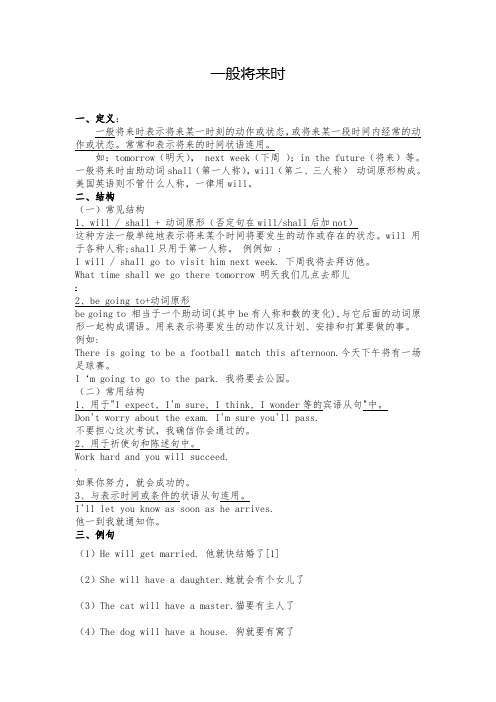一般将来时结构
一般将来时的含义,结构,用法,标志词

一般将来时的含义,结构,用法,标志词一般将来时的含义,结构,用法,标志词一般将来时是英语中表示将来时态的一种形式,用于表达将来会发生的动作或状态。
一般将来时的结构为“will / shall + 动词原形”,或是“be going to + 动词原形”。
在句子中,我们可以根据需要使用助动词“will”或“shall”,但在口语中,“will”更为常用。
而“be going to”则用于表达我们已经有计划或打算去做某事。
在文章中,我将探讨一般将来时的含义、使用方法以及标志词,并结合实例进行详细说明。
一般将来时的主要用途是表达将来的动作或状态。
当我们想要表达对未来的预测、打算、意图、决定或承诺时,可以使用一般将来时。
我们可以说:“I will go to the supermarket tomorrow.”(我明天会去超市。
)这里表示了对未来行动的打算。
而当我们使用“be going to”时,通常是指现在已经有计划或打算去做某事。
例如:“I am going to visit my grandparents next week.”(我下周打算去看望我的祖父母。
)这里表达了我已经计划好的未来行动。
在句子中,我们可以根据需要使用助动词“will”或“shall”。
“I will help you with your homework.”(我会帮你做作业。
)在口语中,“will”更为常用,而“shall”通常只用于第一人称(I 和we)的疑问句和请求句中。
例如:“Shall we go to the cinema tonight?”(我们今晚去看电影好吗?)另外,标志词也是使用一般将来时的重要标志。
“tomorrow”(明天)、“next week”(下周)、“soon”(很快)、“in the future”(在未来)等词汇在句子中表示了动作或状态将要发生的时间。
一般将来时是英语中用于表示将来时态的一种形式,可以通过“will / shall + 动词原形”或是“be going to + 动词原形”进行构成。
[笔记]一般将来时的定义、结构、例句、用法
![[笔记]一般将来时的定义、结构、例句、用法](https://img.taocdn.com/s3/m/605f4e9dd1d233d4b14e852458fb770bf78a3bb1.png)
一般将来时一、定义:一般将来时表示将来某一时刻的动作或状态,或将来某一段时间内经常的动作或状态。
常常和表示将来的时间状语连用。
如:tomorrow(明天),next week(下周);in the future (将来)等。
一般将来时由助动词shll(第一人称),will (第二、三人称)动词原形构成。
美国英语则不管什么人称,一律用will。
二、结构(一)常见结构1、will / shll + 动词原形(否定句在will/shll后加not)这种方法一般单纯地表示将来某个时间将要发生的动作或存在的状态。
will用于各种人称;shll只用于第一人称。
例例如:I will / shll go to visit him next week. 下周我将去拜访他。
Wht time shll we go there tomorrow? 明天我们几点去那儿?2、be going to+动词原形be going to 相当于一个助动词(其中be有人称和数的变化),与它后面的动词原形一起构成谓语。
用来表示将要发生的动作以及计划、安排和打算要做的事。
例如:There is going to be footbll mtch this fternoon.今天下午将有一场足球赛。
I‘m going to go to the prk. 我将要去公园。
(二)常用结构1、用于"I expect, I'm sure, I think, I wonder等的宾语从句"中。
Don't worry bout the exm. I'm sure you'll pss.不要担心这次考试,我确信你会通过的。
2、用于祈使句和陈述句中。
Work hrd nd you will succeed.如果你努力,就会成功的。
3、与表示时间或条件的状语从句连用。
I'll let you know s soon s he rrives.他一到我就通知你。
-一般将来时的结构与用法

Will you pass me that cup? Will you (please) help me with maths? Will you please lend me your pen?
will 在陈述句中用于各人称,在争求意见时或 示说话人向对方提出请求常用于第二人称。
❖ 对特殊疑问句要进行具体回答。
整理ppt
6
一般将来时的主要用法:
1、表示将来某一时刻的动作或状态: We shall(will) come to see you the day after tomorrow. There will be a wonderful show next week.
2、表示将来某一段时间内经常的动作或状态: The students will come and work in the lab once a week. we shall come and work in this factory every year.
10
三、be about to 结构表示将来
表示即将要发生的动作. Hurry up! We're about to leave. The football match is about to begin in a few minutes.
整理ppt
11
四、Revision of all forms with future meaning
----- Will they go there to study English? ----- Yes, they will. ----- No, they will not.
整理ppt
4
Shall we have a drink? Shall I open the window? Where shall we have the meeting?
(完整版)一般将来时的定义、结构、例句、用法

(完整版)一般将来时的定义、结构、例句、用法一般将来时一、定义一般将来时表示将来某一时刻的动作或状态,或将来某一段时间内经常的动作或状态。
常常和表示将来的时间状语连用。
如:tomorrow(明天),next week(下周);in the future (将来)等。
一般将来时由助动词shall(第一人称),will(第二、三人称)动词原形构成。
美国英语则不管什么人称,一律用will。
二、结构(一)常见结构1、will / shall + 动词原形(否定句在will/shall后加not)这种方法一般单纯地表示将来某个时间将要发生的动作或存在的状态。
will用于各种人称;shall只用于第一人称。
例如:I will / shall go to visit him next week. 下周我将去拜访他。
What time shall we go there tomorrow? 明天我们几点去那儿?2、be going to+动词原形be going to 相当于一个助动词(其中be有人称和数的变化),与它后面的动词原形一起构成谓语。
用来表示将要发生的动作以及计划、安排和打算要做的事。
例如:There is going to be a football match this afternoon.今天下午将有一场足球赛。
I‘m going to go to the park. 我将要去公园。
(二)常用结构1、用于"I expect, I'm sure, I think, I wonder等的宾语从句"中。
Don't worry about the exam. I'm sure you'll pass.不要担心这次考试,我确信你会通过的。
2、用于祈使句和陈述句中。
Work hard and you will succeed.如果你努力,就会成功的。
3、与表示时间或条件的状语从句连用。
一般将来时的定义、结构、例句、用法

一般将来时一、定义:一般将来时表示将来某一时刻的动作或状态,或将来某一段时间内经常的动作或状态。
常常和表示将来的时间状语连用。
如:tomorrow(明天),next week(下周);in the future(将来)等。
一般将来时由助动词shall(第一人称),will(第二、三人称)动词原形构成。
美国英语则不管什么人称,一律用will。
二、结构(一)常见结构1、will / shall + 动词原形(否定句在will/shall后加not)这种方法一般单纯地表示将来某个时间将要发生的动作或存在的状态。
will用于各种人称;shall只用于第一人称。
例例如:I will / shall go to visit him next week. 下周我将去拜访他。
What time shall we go there tomorrow? 明天我们几点去那儿?2、be going to+动词原形be going to 相当于一个助动词(其中be有人称和数的变化),与它后面的动词原形一起构成谓语。
用来表示将要发生的动作以及计划、安排和打算要做的事。
例如:There is going to be a football match this afternoon.今天下午将有一场足球赛。
I‘m going to go to the park. 我将要去公园。
(二)常用结构1、用于"I expect, I'm sure, I think, I wonder等的宾语从句"中。
Don't worry about the exam. I'm sure you'll pass.不要担心这次考试,我确信你会通过的。
2、用于祈使句和陈述句中。
Work hard and you will succeed.如果你努力,就会成功的。
3、与表示时间或条件的状语从句连用。
I'll let you know as soon as he arrives.他一到我就通知你。
一般将来时的构造和用法

一般将来时的构造和用法一般将来时是英语中表示将来发生的动作或事件的时态。
它用来描述将来某一时间或情况下预计会发生的事情。
一般将来时的构造和用法有以下几种。
1. 肯定句结构:主语 + will + 动词原形 + 其他2. 否定句结构:主语 + will + not + 动词原形 + 其他3. 一般疑问句结构:Will + 主语 + 动词原形 + 其他?4. 特殊疑问句结构:特殊疑问词 + will + 主语 + 动词原形 + 其他?下面将分别对这些句子结构进行详细解释和示例。
1. 肯定句结构:主语 + will + 动词原形 + 其他肯定句结构用于表达预测、打算、意愿和承诺等将来发生的动作或事件。
以下是一些例句:- I will go shopping tomorrow.(我明天会去购物。
)- They will visit their grandparents next week.(他们下周会去拜访他们的祖父母。
)- She will study abroad next year.(她明年会出国留学。
)2. 否定句结构:主语 + will + not + 动词原形 + 其他否定句结构表示将来某一时间或情况下不会发生的动作或事件。
以下是一些例句:- He will not attend the meeting tomorrow.(他明天不会参加会议。
)- We will not travel to Europe next summer.(我们下个夏天不会去欧洲旅行。
)- The party will not start until 8 p.m.(晚会直到晚上8点才开始。
)3. 一般疑问句结构:Will + 主语 + 动词原形 + 其他?一般疑问句结构用来询问预测、打算、意愿和承诺等将来发生的动作或事件是否会发生。
以下是一些例句:- Will you attend the conference tomorrow?(你明天会参加会议吗?)- Will they come to our party this weekend?(他们这个周末会来我们的派对吗?)- Will she finish her project on time?(她会按时完成她的项目吗?)4. 特殊疑问句结构:特殊疑问词 + will + 主语 + 动词原形 + 其他?特殊疑问句结构用来询问关于将来动作或事件的特定信息。
一般将来时的定义、结构、例句、用法

a.表示计划、打算、准备做的事。
例如:We are going to put up a building here.我们打算在这里盖一座楼。
How are you going to spend your holidays?假期你准备怎样过?
b.表示即将发生或肯定要发生的事。例如:
二、结构
(一)常见结构
1、will / shall +动词原形(否定句在will/shall后加not)
这种方法一般单纯地表示将来某个时间将要发生的动作或存在的状态。will用于各种人称;shall只用于第一人称。例如:
I will / shall go to visit him next week.下周我将去拜访他。
What time shall we go there tomorrow?明天我们几点去那儿?
2、be going to+动词原形
be going to相当于一个助动词(其中be有人称和数的变化),与它后面的动词原形一起构成谓语。用来表示将要发生的动作以及计划、安排和打算要做的事。
例如:
There is going to be a football match this afternoon.今天下午将有一场足球赛。
I think it is going to snow.我看要下雪了。
(五)其他用法
一般将来时表示将来某一时刻的动作或状态,其表达形式除了“shall(第一人称),will(第二、三人称)+动词原形构成”外,还有以下几种形式。
1、“be going to+动词原形”表示即将发生的或打算进行的事。
例如:
2、用于祈使句和陈述句中。
一般将来时的定义、结构、例句、用法

一般将来时一、定义:一般将来时表示将来某一时刻的动作或状态,或将来某一段时间内经常的动作或状态。
常常和表示将来的时间状语连用。
如:tomorrow(明天), next week(下周);in the future(将来)等。
一般将来时由助动词shall(第一人称),will(第二、三人称)动词原形构成。
美国英语则不管什么人称,一律用will。
二、结构(一)常见结构1、will / shall + 动词原形(否定句在will/shall后加not)这种方法一般单纯地表示将来某个时间将要发生的动作或存在的状态。
will用于各种人称;shall只用于第一人称。
例例如 :I will / shall go to visit him next week. 下周我将去拜访他。
What time shall we go there tomorrow 明天我们几点去那儿*2、be going to+动词原形be going to 相当于一个助动词(其中be有人称和数的变化),与它后面的动词原形一起构成谓语。
用来表示将要发生的动作以及计划、安排和打算要做的事。
例如:There is going to be a football match this afternoon.今天下午将有一场足球赛。
I‘m going to go to the park. 我将要去公园。
(二)常用结构1、用于"I expect, I'm sure, I think, I wonder等的宾语从句"中。
Don't worry about the exam. I'm sure you'll pass.不要担心这次考试,我确信你会通过的。
2、用于祈使句和陈述句中。
Work hard and you will succeed.;如果你努力,就会成功的。
3、与表示时间或条件的状语从句连用。
I'll let you know as soon as he arrives.他一到我就通知你。
- 1、下载文档前请自行甄别文档内容的完整性,平台不提供额外的编辑、内容补充、找答案等附加服务。
- 2、"仅部分预览"的文档,不可在线预览部分如存在完整性等问题,可反馈申请退款(可完整预览的文档不适用该条件!)。
- 3、如文档侵犯您的权益,请联系客服反馈,我们会尽快为您处理(人工客服工作时间:9:00-18:30)。
“in与after+时间” 都可表示“在…之后”。当它们用于一 般将来时态时,in后接“时间段”,after后接“时间点”。 1. We will start off in ten minutes. 2. He’ll come back after three o’clock. 注:after+时间段,往往指过去的一段时间。 Eg: 1.He came back after three hours. 注:对in +一段时间提问用 how soon . 对after+一段时间提 问用 when 1.How soon will he be back? In three days. 2.When did he come back? After three days.
时态:一般将来时
3、 shall与will的区别:
shall常用于第一人称 shall 否(w定e/式I ):. shall not = shan’t
缩略形式 பைடு நூலகம்ll
will常用于第二、三人称,但在 will 口语中各种人称都可以用will.
否定式:will not = won’t
区别: be going to/ will ***will表示将来,通常是指事先无计划的意图,是 临时决定的;be going to则表示事先经过考虑或做 好安排.
If you want to go, I’ll meet you at 5 o’clock. (临时的决定)
***表示有迹象要发生某一动作时,要用be going
to
Eg: Look at the clouds! It’ s going to rain!
“There be”句型的一般将来时 肯 定 句:There will be +名词+其他成份. 注意:无论后面加单数名词或复数形式,be都必须用原形。
There will be only one country. 否 定 句:There won’t+名词+其他成份.
There won’t be only one country.
一般疑问句:Will+there+名词+其他成份?
Will there be only one country? Yes, there will. / No, there won’t.
翻译句子
1. 明天我爷爷不会去钓鱼。 My grandpa won’t go fishing tomorrow. 2.我们什么时候再见面。 When shall we meet again? 3. 将来,孩子们会用电脑在家学习。 Kids will study at home on computers in the future.
